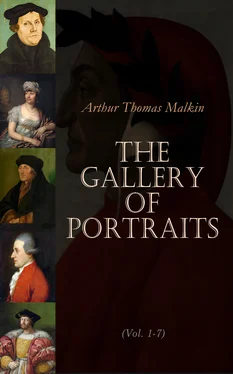While Chancellor some of his injunctions were disapproved by the common law judges. He therefore invited them to dine with him in the council chamber, and proved to them by professional arguments that their complaints were unfounded. He then proposed that they should themselves mitigate the rigour of the law by their own conscientious discretion; in which case, he would grant no more injunctions. This they refused; and the consequence was, that he continued that practice in equity which has come down to the present day.
It was through the intervention of his friend the Duke of Norfolk that he procured his discharge from the laborious, and under the circumstances of the time, the dangerous eminence of the chancellorship, which he quitted in honourable poverty. After the payment of his debts he had not the value of one hundred pounds in gold and silver, nor more than twenty marks a year in land. On this occasion his love of a jest did not desert him. While Chancellor, as soon as the church service was over, one of his train used to go to his lady’s pew, and say, “Madam, my Lord is gone!” On the first holiday after his train had been dismissed, he performed that ceremony himself, and by saying at the end of the service, “Madam, my Lord is gone,” gave his wife the first intimation that he had surrendered the great seal.
He had resolved never again to engage in public business; but the divorce, and still more the subsequent marriage with Anne Boleyn, which nothing could induce him to favour, with the King’s alienation from the see of Rome, raised a storm over his head from which his voluntary seclusion at Chelsea, in study and devotion, could not shelter him. When tempting offers proved ineffectual to win him over to sanction Anne Boleyn’s coronation by his high legal authority, threats and terrors were resorted to: his firmness was not to be shaken, but his ruin was determined, and ultimately accomplished. In the next parliament he, and his friend Fisher, Bishop of Rochester, were attainted of treason and misprision of treason for listening to the ravings of Elizabeth Barton, considered by the vulgar as the Holy Maid of Kent, and countenancing her treasonable practices. His innocence was so clearly established, that his name was erased from the bill; and it was supposed to have been introduced into it only for the purpose of shaking his resolution touching the divorce and marriage. But though he had escaped this snare his firmness occasioned him to be devoted as a victim. Anne Boleyn took pains to exasperate the King against him, and when the Act of Supremacy was passed in 1534, the oath required by it was tendered to him. The refusal to take it, which his principles compelled him to give, was expressed in discreet and qualified terms; he was nevertheless taken into the custody of the Abbot of Westminster, and upon a second refusal four days after was committed prisoner to the Tower of London.
Our limits will not allow us to detail many particulars of his life while in confinement, marked as it was by firmness, resignation, and cheerfulness, resulting from a conscience, however much mistaken, yet void of intentional offence. His reputation and credit were very great in the kingdom, and much was supposed to depend on his conduct at this critical juncture. Archbishop Cranmer, therefore, urged every argument that could be devised to persuade him to compliance, and promises were profusely made to him from the King; but neither argument nor promises could prevail. We will give the last of these attempts to shake his determination, in the words of his son-in-law, Mr. Roper:—
“Mr. Rich, pretending friendly talk with him, among other things of a set course, said this unto him: ‘Forasmuch as is well known, Master More, that you are a man both wise and well learned, as well in the laws of the realm as otherwise, I pray you, therefore, sir, let me be so bold as of good-will to put unto you this case. Admit there were, sir, an act of parliament that the realm should take me for King; would not you, Mr. More, take me for King?’ ‘Yes, sir,’ quoth Sir Thomas More, ‘that would I.’ ‘I put the case further,’ quoth Mr. Rich, ‘that there were an act of parliament that all the realm should take me for Pope; would not you then, Master More, take me for Pope?’ ‘For answer, sir,’ quoth Sir Thomas More, ‘to your first case the parliament may well, Master Rich, meddle with the state of temporal princes; but to make answer to your other case, I will put you this case. Suppose the parliament would make a law that God should not be God; would you then, Master Rich, say that God were not God?’ ‘No, sir,’ quoth he, ‘that would I not; sith no parliament may make any such law.’ ‘No more,’ quoth Sir Thomas More, ‘could the parliament make the King supreme head of the Church.’ Upon whose only report was Sir Thomas indicted of high treason on the statute to deny the King to be supreme head of the Church, into which indictment were put these heinous words, maliciously , traitorously , and diabolically .”
Sir Thomas More in his defence alleged many arguments to the discredit of Rich’s evidence, and in proof of the clearness of his own conscience; but all this was of no avail, and the jury found him guilty. When asked in the usual manner why judgment should not be passed against him, he argued against the indictment as grounded on an Act of Parliament repugnant to the laws of God and the Church, the government of which belonged to the see of Rome, and could not lawfully be assumed by any temporal prince. The Lord Chancellor, however, and the other Commissioners gave judgment against him.
He remained in the Tower a week after his sentence, and during that time he was uniformly firm and composed, and even his peculiar vein of cheerfulness remained unimpaired. It accompanied him even to the scaffold, on going up to which, he said to the Lieutenant of the Tower, “I pray you, Master Lieutenant, see me safe up, and for my coming down let me shift for myself.” After his prayers were ended he turned to the executioner and said, with a cheerful countenance, “Pluck up thy spirits, man, and be not afraid to do thine office. My neck is very short, take heed, therefore, thou strike not awry for thine own credit’s sake.” Then laying his head upon the block, he bid the executioner stay till he had removed his beard, saying, “My beard has never committed any treason;” and immediately the fatal blow was given. These witticisms have so repeatedly run the gauntlet through all the jest-books that it would hardly have been worth while to repeat them here, were it not for the purpose of introducing the comment of Mr. Addison on Sir Thomas’s behaviour on this solemn occasion. “What was only philosophy in this extraordinary man would be frenzy in one who does not resemble him as well in the cheerfulness of his temper as in the sanctity of his manners.”
He was executed on St. Thomas’s eve in the year 1555. The barbarous part of the sentence, so disgraceful to the Statute-book, was remitted. Lest serious-minded persons should suppose that his conduct on the scaffold was mere levity, it should be added that he addressed the people, desiring them to pray for him, and to bear witness that he was going to suffer death in and for the faith of the holy Catholic Church. The Emperor Charles V. said, on hearing of his execution, “Had we been master of such a servant, we would rather have lost the best city of our dominions than such a worthy councillor.”
No one was more capable of appreciating the character of Sir Thomas More than Erasmus, who represents him as more pure and white than the whitest snow, with such wit as England never had before, and was never likely to have again. He also says, that in theological discussions the most eminent divines were not unfrequently worsted by him; but he adds a wish that he had never meddled with the subject. Sir Thomas More was peculiarly happy in extempore speaking, the result of a well-stored and ready memory, suggesting without delay whatever the occasion required. Thuanus also mentions him with much respect, as a man of strict integrity and profound learning.
Читать дальше












